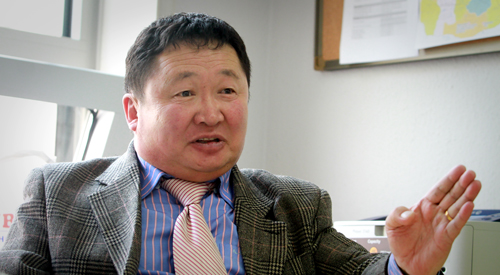– Together with Oyu Tolgoi, youth are creating a bright future for Mongolia –

We interviewed D. Enkhbaatar, training superintendent at Oyu Tolgoi, about mine related training programmes and the opportunity for youth to work at the project
There are many young people who would like to work in the mining industry. However, does everybody have such an opportunity? How does Oyu Tolgoi approach training for its workers?
I want to say everybody has this opportunity. Oyu Tolgoi began training its work force in 2010. First, 100 people were recruited and began training as concentrator operators, heavy equipment operators and electricians. As of today, we have trained about 400 people in total. Twentyfour young people received technological training at the Erdenet mine as operators of heavy equipment and began to work in the open pit at Oyu Tolgoi last July. Initially, they were operating small, 60 tonne trucks and now they have graduated to the 290 tonne Komatsu 930E truck. We have also selected 20 young people to train in multiple capacities. These people can now operate 4-5 types of equipment. The training was completed last March and now 19 of these young people are employed at the Oyu Tolgoi project. The training of 60 youth at the Polytechnic college of Darkhan began in April 2011. Select trainees from Darkhan and Erdenet were sent to the Kennecott mine in the USA for further skill development. They will participate in a 1 month practical training and then work in the concentrator at Oyu Tolgoi. Also, the Infrastructure department has 28 youth currently training as electricians at the Erdenet concentrator. The training has begun to produce positive outcomes and the first trainees are successfully working at the project. Together with Mongolia’s youth, we are creating opportunities at Oyu Tolgoi.
You said everybody has the opportunity to work at Oyu Tolgoi. How fair is the selection process?
Oyu Tolgoi is an equal opportunity employer. We announce any vocational training opportunities through our website and daily newspapers. No one is discriminated based on age or gender. Anybody above the age of 18 can apply for our trainings. An entry exam is offered and anybody who passes the exam can go to the next round of interviews. Since the selection process is transparent, everybody has the opportunity to work here. There are many examples of graduates who successfully completed the training courses and started working with the company.
How skilled are the youth of Mongolia in operating heavy equipment and machinery? How fast are they learning?
People with many different skill levels are trained. All this depends on the individual’s effort. It does not matter what he or she was doing before. Individual effort and hard work is the main factor because our training is based on competency. There is a training centre at the Oyu Tolgoi project site and soon a vocational training centre will be opened in Khanbogd.
It has been a long time since Mongolians have trained as mining specialists. How many people will work at the mine?
There are estimates that 3,500 people will work at the Oyu Tolgoi mine once it is completed. According to the Investment Agreement, the mine is committed to keep a ratio of Mongolian and international workers at 90:10. Based on this ratio, there is a need to train thousands of Mongolian nationals for mine operations. Oyu Tolgoi is one of largest mining projects in the world and will use the latest equipment, machinery and technology. Our training department is selecting Mongolians for various training at vocational schools. We are also selecting from current Oyu Tolgoi employees for advanced level trainings.
Is there currently a school to train qualified mining specialists in Mongolia? Does the training curriculum and equipment meet international standards?
The current level of vocational education schools in Mongolia does not meet the requirements to train highly skilled mining specialists. Therefore, Oyu Tolgoi is committed to the improvement of Mongolian vocational educational centres. According to the Investment Agreement, Oyu Tolgoi is supporting vocational training schools in Mongolia. Oyu Tolgoi is investing in the vocational schools through equipment upgrades, building renovations and the improvement of its training curriculum. Improving the capacity of teaching staff in compliance with international standards is also a high priority for the programme.
Good teachers are essential for training a qualified workforce. Is there need to train vocational trainers and teachers?
The skills and knowledge of teachers and trainers currently falls short of international standards. However, this situation is improving. Oyu Tolgoi is financing Mongolian vocational educational programmes with a total of 110 billion MNT (US$85 million). This is the largest vocational educational programme in the history of Mongolia. Under this financing, 3 new vocational schools of excellence will be built, 4 schools will be upgraded and 1,200 teachers will be trained up to international standards. Equipment manufacturers provide trainers to build the skill level of the Mongolian vocational trainers and teachers. 90 vocational teachers are being trained now under the teachers training programme and they will graduate in soon.
What other investments does Oyu Tolgoi make in the education sector of Mongolia? What are the major social initiatives for the mine?
On top of training its workforce, Oyu Tolgoi is implementing a project to train 3,300 people in 3 years and committed to spending a total of US$30 million for training of a national workforce in Mongolia. This investment covers training fees, all expenses related to training and scholarships for students. Under this project, many initiatives have been taken to upgrade and improve vocational educational curriculum in non-mining related areas. By next June, the latest training equipment will be delivered to 21 vocational schools around Mongolia. We not only supply this equipment, but also will provide the training for the vocational school teachers.
Leave a Reply
You must be logged in to post a comment.